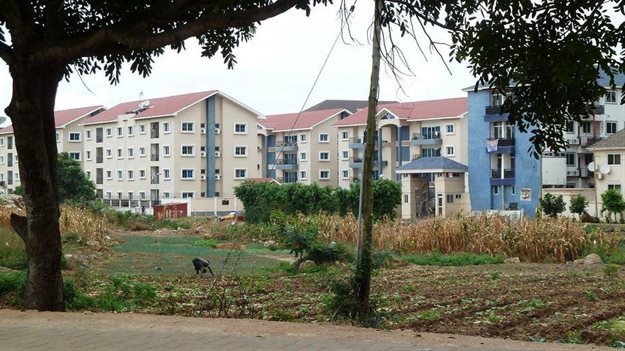Ghana's new rental scheme won't fix the real problem: a housing shortage

Scholars have highlighted several problems this advance rent payment poses to renters. They include psychological distress over difficulty in raising the funds, and forgoing basic necessities such as food, healthcare and leisure in order to save for the advance rent. Evidence so far suggests that it is the period over which tenants have to pay the advance rent that is the problem. It is not the rent charged that is the problem but the period over which it is multiplied to arrive at the advance rent. This also suggests that the problem is largely a housing supply problem.
Ahead of the December 2020 presidential election, the issue of affordable housing was on the agenda of the two major parties – the New Patriotic Party and the National Democratic Congress. On 12 March the re-elected government announced details of its scheme. The scheme is available to those in formal employment with identifiable and regular income.
As a team of international housing academics, we agree with the Ghanaian government that tenants need assistance, but our research concludes that the approach needs to be vastly different to what government has announced. The National Rental Assistance Scheme will only further legitimise and prolong the demand for advance rent, an illegal practice.
A financial burden
Ghana’s rental system is broken. Our research has over time scrutinised the practice of demanding a two-year deposit. Its impact is felt most acutely in Ghana’s informal rental sector, which makes up 80% of the country’s housing stock.
The research is based on an original survey of tenants in the informal sector in Dansoman, a municipal capital in the Greater Accra region of Ghana. It started as a neighbourhood of state-owned estates for public sector workers in Accra. It is located close to the trading hubs of Kaneshie and Agbogbloshie and Kwame Nkrumah Circle, making it a preferred residential location for the informal sector. The social composition of Dansoman is a blend of low, middle and high income groups.
By our estimates, no more than one in five tenants paying the two-year advance rent will be eligible to receive support from the government’s advance rent assistance scheme. Rather than resolving the issue, the government’s new scheme is in danger of legitimising an illegal practice that won’t fix Ghana’s housing crisis.
The Ghana Rent Act of 1963 (as amended) states that a deposit of six months is the maximum that a landlord can request from a tenant. This national rental assistance scheme will embolden landlords to keep charging the two-year advance rent which is illegal in terms of the Rent Act.
The Ghanaian government presents the rental assistance scheme as a way of assisting tenants struggling to pay the advance rent. In reality it’s a scheme that is in danger of entrenching a divisive social norm. Our research highlighted how Ghana’s rental problem exacerbates inequality. This is because some tenants are able to draw upon relatives living abroad, friends, or employers to help them pay their loan. The majority end up impoverishing themselves just to remain in the rental sector.
Reduced labour mobility
Young people on low incomes are especially vulnerable. They have little choice but to accept these punitive terms. As a consequence, they become saddled with enormous debts. The two-year deposit is not a property bond. Unlike a rent deposit or bond in more regulated markets, the tenant does not get back this lump sum. It is two years’ worth of rent paid upfront. This means the lump sum the tenant pays freezes the payment of rent for two years.
We found that first-time renters had to save their monthly incomes for a little over nine months and regular renters for a period of seven months in order to take up the tenancy.
Our research revealed that this system has an impact on young people’s labour mobility in Ghana. This is significant considering that 21.3% and 22.5% of the unemployed population in Ghana respectively live in the Greater Accra and Ashanti Region where most jobs are concentrated. The general housing deficit in the country and the potential lock-in effect of the rent advance system make it difficult for tenants to easily move to where jobs are, even within big cities.
Proponents of the rental sector say that it gives tenants flexibility to manage personal budgets, allowing them to have mobility as they search for work. But the burden of finding two years’ rent in advance results in regular tenants, in particular, remaining in their properties for around 10 years. This suggests that tenants are anything but mobile.
A two-fold challenge
Ghana has a two-fold housing challenge. In the absence of a functioning insurance scheme for landlords, they pass risk on to tenants. There is also inadequate provision of affordable housing in Ghana. So, demand outstrips supply and landlords can ask for, and receive, two years’ rent in advance.
The new scheme is only available to people with regular income in both formal and informal employment. Loans will be offered when employment is with a formally registered company and a salary is involved. This risks exacerbating inequality. Many will not be eligible as they make ends meet in the informal employment sector where their income streams are not typically viewed as regular. This is despite the fact that in some cases regularity can be established for informal sector employees. It could also lead to exploitation of those receiving the loans, as employers could abuse the fact that continued residence in their homes is dependent on continued employment.
A way forward
Ghana needs an overhaul of its broken rental sector. Rather than a national scheme to help private landlords mitigate risk, there should be a push to work with district assemblies and chiefs who play a critical role in local governance and development. For example, chiefs are the custodians of valuable land that could be released to create low cost housing schemes.
Government can support this bottom-up approach to the housing problem by empowering District Assemblies to make housing provision a key part of their mandate while exploring innovative models to access land and finance housing development. We believe it is by increasing the supply of rental housing that the monopoly power of private landlords who charge longer periods of advance rent can be broken.
This article is republished from The Conversation under a Creative Commons license. Read the original article.![]()
Source: The Conversation Africa

The Conversation Africa is an independent source of news and views from the academic and research community. Its aim is to promote better understanding of current affairs and complex issues, and allow for a better quality of public discourse and conversation.
Go to: https://theconversation.com/africa











